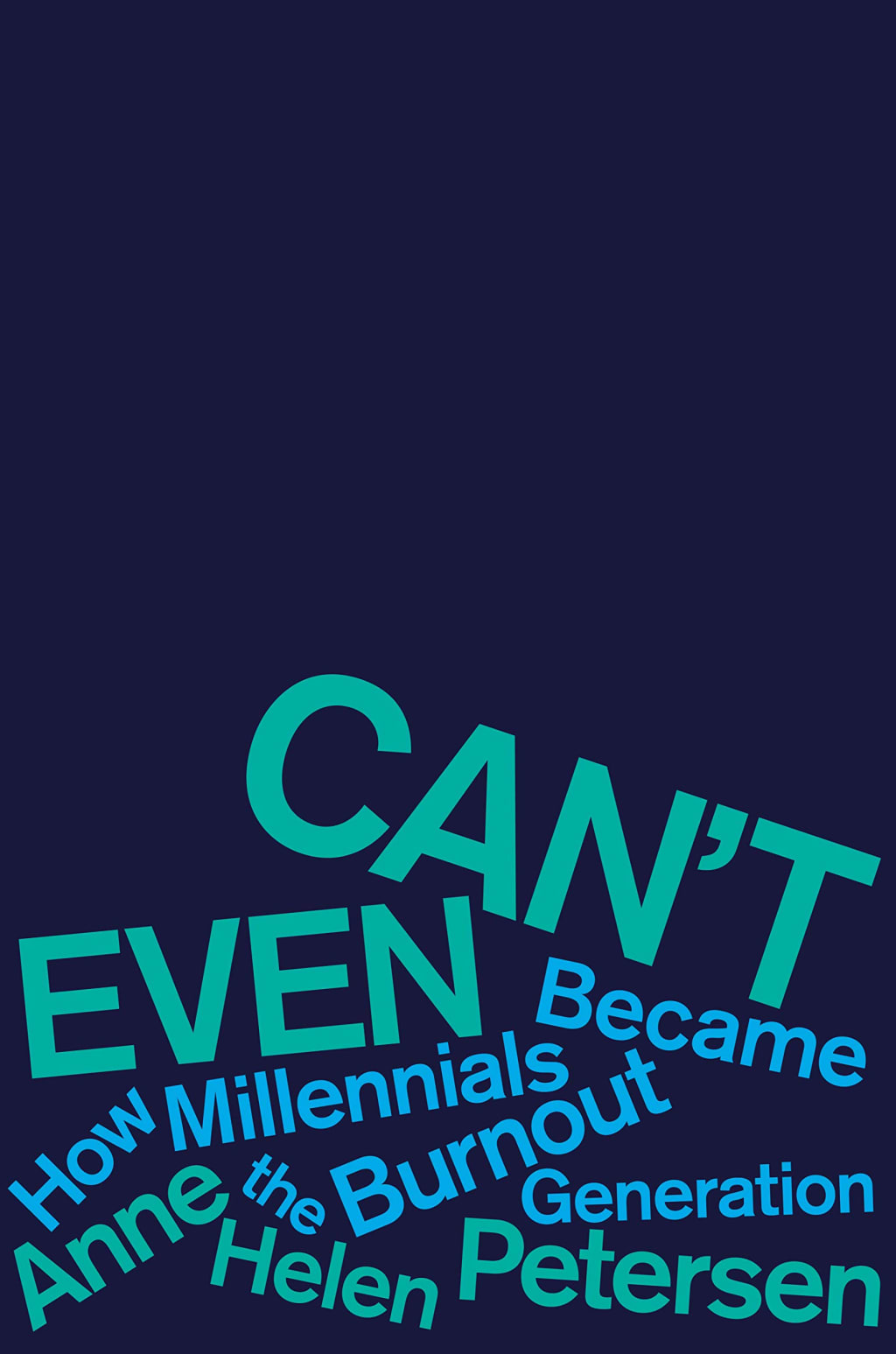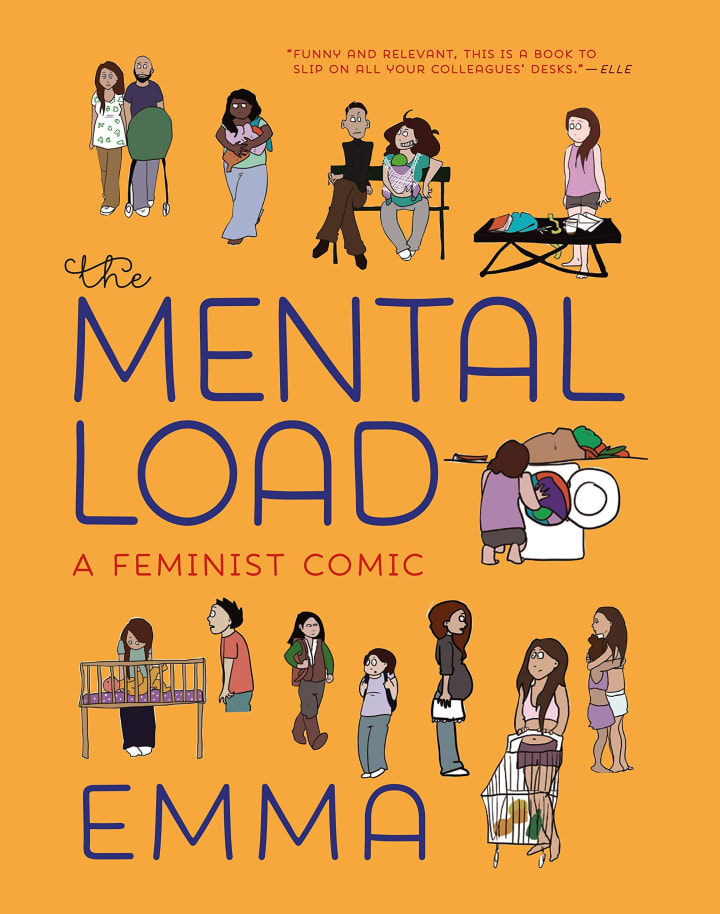Book Review: "Can't Even: How Millennials Became the Burnout Generation"
By Anne Helen Petersen

On January 5th, 2019, Anne Helen Petersen, a news reporter for Buzzfeed, published an article, "How the Millennials Became the Burnout Generation," and within hours it skyrocketed to the top of the site's most read articles, and had amassed thousands of discussions in the comment section. The result of the amount of feedback is this book, published in September of 2020.
Everyone needs to read this book, not just Millennials. There is a systemic problem of overworked, exhausted people in the United States who blame themselves when they reach stress levels that are mental and physical breaking points. Petersen's interviews, her own experiences and research validated so many, many things I deal with on a daily basis, and made me feel less alone; "millennials live with the reality that we're going to work forever, die before we pay off our student loans, potentially bankrupt our children with our care, or get wiped out in a global apocalypse...that's the new normal" (Petersen, 25). Petersen has a disclaimer early on in the book that she did not write this with the intention of providing a clear-cut solution to the present day results of social, racial, and economic U.S. history.
Instead it reads as a narrative of how we got to where we are today, and that when we collectively take a step back and look at the larger picture, the sheer scale of enmeshed variables comes into focus. We, as a generation, as several generations, as United States citizens, can see that we do know what we want, we just need to take the first step in acknowledging that the current system is broken, flawed, and exploitive. But it doesn't have to be, "I'm talking about a different way of thinking about work, and personal value, and profit incentives- and the radical idea that each of us matter, and are actually essential and worthy of care and protection...if you think that's too radical of an idea, I don't know how to make you care about other people," (Petersen, 25). I am a person, a person that needs to take care of themselves, not constantly be working, thinking about work, planning for work, for a job that doesn't even pay me a living wage. Let me say that again. I spend 10 hours (commute included), five days a week, at a job that requires a bachelor's degree or higher and passing a civil service test as one of the top three scores, and does not pay me a living wage.

I recently brought my case to the union representative where I work; that as a civil service Library Clerk (that has a job description of half a paragraph and has not been updated since 1997), I work so far out of that job description that my position needs to be re-assessed and changed to either an "Assistant Librarian," or "Library Assistant Director." Either would result in job descriptions that accurately reflect the six page document of what I currently do at my job, a required component of the desk audit I was asked to provide when I finally worked up the nerve to advocate for myself. It took over a year and a half to finally talk myself into doing this. I knew I was being taken advantage of, but didn't see myself as the valuable asset that I am until I started reading this book, "of course, no worker asks their employer to value them less, but the rhetoric of "Do what you love" makes asking to be valued seem like the equivalent of unsportsmanlike conduct. Doing what you love exposes its adherents to exploitation, justifying unpaid or underpaid work by throwing workers' motivations back at them," (Petersen, 72). I re-read this so many times when I read this book and it really stuck with me, and again, was incredibly validating.
I do not enjoy my weekends because I'm thinking about my job. While I'm on vacation I am constantly tempted to check my work email, or simply have it open all week long on my computer. The financial people at the top absolutely took advantage of my age and enthusiasm at landing such a high position so early in my career as a librarian. They knew I had (and still have) plans to get my masters degree after a few years working in the field, and in the meantime they have accepted requests from me to attend book repair classes, metadata classes, and promoted my award from NYLA to attend the 2019 conference for free, as the winner of a selective scholarship/grant. After reading this book I started to ask myself: why would they approve and pay for those classes if they didn't value me, or even follow up? Now that I have more specialized skills and can (and have) taken on more responsibility, projects, and tasks, why wasn't I being compensated for it? Within three minutes into the meeting with the financial department head and my union rep, the former said, "I thought you liked your position?" to which I immediately responded, "I love everything I do, and am not looking to delegate or feel overwhelmed, but I now have skills and knowledge that even the director does not have, I do much more work than a Library Clerk, and feel that as a valuable asset to the library, I need to be fairly compensated." It was then that he asked for the desk audit. Just so he would know he had at least a month before he had to deal with me again. "Getting paid for working should not be a luxury," (Petersen, 81).

The second component of "burnout" that I, personally, identified in this book is something Petersen refers to as, "errand paralysis." Which, in summary, is due to our society shoving in our faces that we should be working all day, every day, many people have a to-do list that is a perpetual, never ending list of high-mental cost, low-reward, boring shit. I have one of these lists and it is the bane of my existence. It permeates every part of my life. On my drive to work something that needs to be added will pop into my brain, or when I am at the grocery store, in the shower, or watching a movie. I do not enjoy vacation time because I have to fill the first free time I've had since my last vacation with my endless list of things I have been putting off because I'm so drained when I come home from work every day, that I have depleted my mental energy stores to do anything else.
And then I begin to shame myself, berate myself, trying, as Petersen did, to figure out why I couldn't seem to do what I watched my parents do as I grew up, "the more I tried to figure out my errand paralysis, the more the actual parameters of burnout began to reveal themselves. Burnout and the behaviors and weight that accompany it aren’t, in fact, something we can cure by going on vacation. It’s not limited to workers in acutely high-stress environments. And it’s not a temporary affliction: It’s the millennial condition. It’s our base temperature. It’s our background music. It’s the way things are. It’s our lives," (Petersen, BuzzFeed). I have tried hissing less under my breath since reading "Can't Even," but I still have a long way to go; "why can't you be better?" "why can't you just DO the things on your to-do list?" "You're so lazy, so entitled, so--"...you get the idea.

As for other generations reading this book, it combines strong readability with Petersen's sincere and engaging writing voice to successfully share the Millennial experience with the boomer generation, which are particularly fond of telling Millennials how spoiled and entitled we are without taking into account how we got here. They will read statistics and data reflecting that Millennials are actually experiencing burnout by the time they are 23-25 years old, which at the very least is a national health crisis, if not something more serious. Petersen is able to reach boomers, and I think that those who read this book will find themselves saying "hell yes!" to so much of it.
The entirety of the United States has been gaslit, "we convince workers that poor conditions are normal; that rebelling against them is a symptom of generational entitlement; that free-market capitalism is what makes America great and this is free-market capitalism in action. It turns legitimate grievance, backed by a union or not, into "ungratefulness." And it standardizes overwork and surveillance and stress and instability--the very building blocks of burnout," (Petersen, 115). We've reached a point in our society, and are so isolated and cut off from real information, that all we have now is propaganda from our government telling its own citizens (who are supposed to be under its protection), that if they don't have enough food, if they can't keep a job because they don't have access to childcare, if they can't go back to school because it's impossible to work and be in school full time, that it's their own fault. And the rich, white, male, and privileged politicians making decisions, cling to the Great Gatsby fantasy of the American dream so tightly because if they don't, they will have to face reality; their entire political career spread out with yellow highlighter marking all the lies, cover-ups, and open distain for anyone asking for help, "that's the thing about American governmental intervention: when it's effective, it's enveloped in a narrative of "American ingenuity and hard work": when it's ineffective, it's proof of the fundamentally immoral nature of government assistance, (Petersen, 99).

So now what?, asks Petersen. We know the system is broken, and we know what we want, what we value, and that we deserve living wages, and self care, and to be able to take a vacation that isn't working from home without getting paid because your entire life has been filled with people screaming at you:
"GO, GO, GO! Join every club at school, volunteer everywhere you can in any spare time you have, get on the AP track in high school to double your workload at 17 years old so that you can start college with credits. Get a part-time job and a full time job over the summer. Go to college, take out loans, get work study and do your homework in between shift changes at the dining hall and at your second job at the diner downtown for the night shift. Drink the red-bull they sell in 12 packs at the overpriced campus store. Get involved in campus groups, join the campus gym, choose the grab-and-go option at the dining hall because you don't have time to sit and eat. Get an unpaid internship and don't question it, just get a job at a bar to pay for the gas to get there. Ask professors for recommendation letters for grad school. Start applying for grad programs while studying for mid-terms Senior year. Go right to grad school or immediately find a job, create a Linkedin account, network, attend alumni events. Get married, have children, find childcare or budget if a stay at home parent is needed. Every week clip coupons and grocery shop; clean the house, do your taxes, maintain your cars, register to vote, renew your drivers license, call your parents, schedule doctor's appointments, soccer practice, and book club. Call your siblings, call your parents, text your partner to pick up dinner tonight, don't forget your Zoom therapy appointment on Tuesday, email the landlord about that weird thing happening with your sink, talk to the payroll office about your retirement plan at work, and never, ever, take a day off."
This spiel (and all variations) and mental check list of expectations most Millennials carry with them all the time, is ingrained into our collective subconscious and has evolved into an even more rigorous, anxiety producing and unattainable list. in the relatively short amount of time since I graduated college I noticed this, and so did Petersen, "We didn’t try to break the system, since that’s not how we’d been raised. We tried to win it....I knew it was winnable for only a small few. I just believed I could continue to optimize myself to become one of them. And it’s taken me years to understand the true ramifications of that mindset...Grad school, then, is where I learned to work like a millennial, which is to say, all the time," (Petersen, BuzzFeed).
I could write an entire separate article about burnout and the realities of a two parent household regarding women primarily taking over as "household managers," so to speak. For now, I will leave readers with a link to a piece written by the very highly regarded French Feminist author, Emma, "The Mental Load." and will return to the subject in a future article.

Burnout is seeping from our work lives into our daily lives; books and shows about minimalist living, ads for self-care like spas, yoga, rage-rooms, Zoom meetings for support groups, 12-step programs, and guided meditation showing up as a result of targeted advertising on every website we visit. Now even our free time is starting to become just as structured as our work lives. We are losing the balance that is needed to be active, social members in our communities, and as people. Not individual entities with a barrier of technology between you and every person you met but never truly feel like you knew. The barrier of technology is so dangerous in that we are already seeing higher levels of anxiety, and at the farthest end of the spectrum, even suicides, in late-elementary and middle-school age children in the United States, particularly in relation to social media.
We need to stop being distracted by this inconceivably huge algorithm designed to placate us, gaslight us, and take advantage of us, all the while subtly undermining the confidence we should have in ourselves. Being able to make and carry out our own, independently made decisions is what it means to be a human being, a person with rights, and not robots that can be replaced or tracked while we work in Amazon warehouses like some kind of animal. We need to come together as a country and demand change, even if we agree on nothing else. This is, and will continue to be, our new normal. The end of this book had me surging with not what I would call "optimism," but with a sense of purpose. Petersen is issuing a "call to arms" for Millennials and Boomers alike to come together and finally admit that the American Dream is myth, debunk it publicly, and address all of the facets that are involved when an entire country full of people suffering from burnout are finally spiraling down for a crash landing.

If you enjoyed this book review, check out some more on my goodreads account.
About the Creator
Carly Doyle
Writer, Librarian, Researcher, Activist. I could keep listing things but, hey, why don't you just take a gander at my writing?






Comments
There are no comments for this story
Be the first to respond and start the conversation.